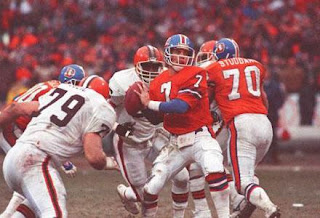Browns  Browns Archive
Browns Archive  The Drive: Twenty Years Later
The Drive: Twenty Years Later
 Browns Archive
Browns Archive  The Drive: Twenty Years Later
The Drive: Twenty Years Later
Written by
Erik Cassano
 Not that you wanted or needed any reminding, but Thursday was the 20th anniversary of "The Drive". It was January 11, 1987 and the Browns were on the cusp of the Super Bowl for the first time in nearly 20 years. They had a star-studded offense led by a thinking man's quarterback, Bernie Kosar. The Broncos hadn't been to a Super Bowl since getting thrashed by the Dallas Cowboys 10 years beforehand. They had a no-name offense, save for Elway, who was a man ahead of his time. We all know the rest. Papa Cass looks back on this sad day for Cleveland sports fans.
Not that you wanted or needed any reminding, but Thursday was the 20th anniversary of "The Drive". It was January 11, 1987 and the Browns were on the cusp of the Super Bowl for the first time in nearly 20 years. They had a star-studded offense led by a thinking man's quarterback, Bernie Kosar. The Broncos hadn't been to a Super Bowl since getting thrashed by the Dallas Cowboys 10 years beforehand. They had a no-name offense, save for Elway, who was a man ahead of his time. We all know the rest. Papa Cass looks back on this sad day for Cleveland sports fans.
 Not that you wanted or needed any reminding, but Thursday was the 20th anniversary of a landmark moment for a man and a city.
Not that you wanted or needed any reminding, but Thursday was the 20th anniversary of a landmark moment for a man and a city.
The moment was good for the man, and helped contribute to a self-loathing complex that the city is mired in to this day.
The man was John Elway. The city, if you hadn't already guessed it by the "self-loathing" reference, was Cleveland.
It was January 11, 1987 and the Browns were on the cusp of the Super Bowl for the first time in nearly 20 years. They had a star-studded offense led by a thinking man's quarterback, Bernie Kosar.
The Broncos hadn't been to a Super Bowl since getting thrashed by the Dallas Cowboys 10 years beforehand. They had a no-name offense, save for Elway, who was a man ahead of his time.
In much the same way that Cal Ripken Jr. was a tall, hard-hitting shortstop an era too early, Elway was an athletic, scrambling, rocket-armed quarterback about a decade before Steve Young and Mark Brunell made that type of quarterback the prototype.
The thing is, before that AFC Championship Game, most people would have taken Kosar's brains over Elway's athleticism. The QB position is where football's chess match occurs, and you need a guy with a quick mind before you need quick legs.
Or so the popular theory went. But Elway was about to blow that out of the water.
Elway might not have had Kosar's ability to dissect a defense on the fly, at least at that point. But he had one thing Kosar didn't: He had a competitive streak that bordered on vicious.
Michael Jordan had it. Pete Rose had it. That desire to be the one who delivers the dagger shot. The ability to be utterly ruthless with the game on the line. The type of competitor who could get just as much satisfaction from 80,000 stunned-silent fans of the opposition as he could from 80,000 home fans cheering at the top of their lungs.
Within the span of 30 months, both Jordan and Elway had their coming-out parties by slaying a Cleveland team at home in the playoffs.
I won't go through the gory blow-by-blow of what has come to be known as "The Drive," as has been done ad nauseum over the years, but suffice it to say that Elway reached another level of consciousness for those four minutes. He ran faster, he thought faster, he threw harder.
Marty Schottenheimer gets a lot of flack for his "prevent" defense during Elway's drive, but Elway was so determined to win and so elusive on foot, it might not have mattered if the Browns had rushed seven guys at him. Elway's vast physical gifts were carrying him.
When Rich Karlis' field goal knuckled just inside the upright in overtime, a watershed moment had been secured. Elway was going to be a pillar of the NFL for years to come, and Cleveland was on the road to seeing itself as Heartbreak City, U.S.A.
The Browns dug their heels in long enough to be eliminated by the Broncos again in two of the next three years, but that game really represents a high-water mark the franchise has not been able to reach since.
Elway, as we know, went on to win a pair of Super Bowls and have his path to Canton lined with rose petals. He retired after knocking off the Falcons in Super Bowl XXXIII, one of the few players to leave a champion, and not look back.
Those days are long gone. The Browns and Broncos are now like ships passing in the night. Once in a while, the perennial playoff-contending Broncos will show up and smack the undertalented Browns around for four quarters, but the simmering hatred is no longer there. The rivalry didn't die when Elway left, it died when the Browns left.
But the impact of that game still lingers. Somehow, a stadium and franchise later, the emotional scar from that game still lingers in Cleveland, heavier than Earnest Byner's fumble, heavier than Jordan's shot, heavier than even Jose Mesa's blown save in Game 7, which is the only one of the above that directly cost Cleveland a championship.
In the cluttered closet of Cleveland sports memories, it's The Drive that hurts the most. You remember your first heartbreak like you remember your first love. It never really goes away.
 Not that you wanted or needed any reminding, but Thursday was the 20th anniversary of a landmark moment for a man and a city.
Not that you wanted or needed any reminding, but Thursday was the 20th anniversary of a landmark moment for a man and a city.The moment was good for the man, and helped contribute to a self-loathing complex that the city is mired in to this day.
The man was John Elway. The city, if you hadn't already guessed it by the "self-loathing" reference, was Cleveland.
It was January 11, 1987 and the Browns were on the cusp of the Super Bowl for the first time in nearly 20 years. They had a star-studded offense led by a thinking man's quarterback, Bernie Kosar.
The Broncos hadn't been to a Super Bowl since getting thrashed by the Dallas Cowboys 10 years beforehand. They had a no-name offense, save for Elway, who was a man ahead of his time.
In much the same way that Cal Ripken Jr. was a tall, hard-hitting shortstop an era too early, Elway was an athletic, scrambling, rocket-armed quarterback about a decade before Steve Young and Mark Brunell made that type of quarterback the prototype.
The thing is, before that AFC Championship Game, most people would have taken Kosar's brains over Elway's athleticism. The QB position is where football's chess match occurs, and you need a guy with a quick mind before you need quick legs.
Or so the popular theory went. But Elway was about to blow that out of the water.
Elway might not have had Kosar's ability to dissect a defense on the fly, at least at that point. But he had one thing Kosar didn't: He had a competitive streak that bordered on vicious.
Michael Jordan had it. Pete Rose had it. That desire to be the one who delivers the dagger shot. The ability to be utterly ruthless with the game on the line. The type of competitor who could get just as much satisfaction from 80,000 stunned-silent fans of the opposition as he could from 80,000 home fans cheering at the top of their lungs.
Within the span of 30 months, both Jordan and Elway had their coming-out parties by slaying a Cleveland team at home in the playoffs.
I won't go through the gory blow-by-blow of what has come to be known as "The Drive," as has been done ad nauseum over the years, but suffice it to say that Elway reached another level of consciousness for those four minutes. He ran faster, he thought faster, he threw harder.
Marty Schottenheimer gets a lot of flack for his "prevent" defense during Elway's drive, but Elway was so determined to win and so elusive on foot, it might not have mattered if the Browns had rushed seven guys at him. Elway's vast physical gifts were carrying him.
When Rich Karlis' field goal knuckled just inside the upright in overtime, a watershed moment had been secured. Elway was going to be a pillar of the NFL for years to come, and Cleveland was on the road to seeing itself as Heartbreak City, U.S.A.
The Browns dug their heels in long enough to be eliminated by the Broncos again in two of the next three years, but that game really represents a high-water mark the franchise has not been able to reach since.
Elway, as we know, went on to win a pair of Super Bowls and have his path to Canton lined with rose petals. He retired after knocking off the Falcons in Super Bowl XXXIII, one of the few players to leave a champion, and not look back.
Those days are long gone. The Browns and Broncos are now like ships passing in the night. Once in a while, the perennial playoff-contending Broncos will show up and smack the undertalented Browns around for four quarters, but the simmering hatred is no longer there. The rivalry didn't die when Elway left, it died when the Browns left.
But the impact of that game still lingers. Somehow, a stadium and franchise later, the emotional scar from that game still lingers in Cleveland, heavier than Earnest Byner's fumble, heavier than Jordan's shot, heavier than even Jose Mesa's blown save in Game 7, which is the only one of the above that directly cost Cleveland a championship.
In the cluttered closet of Cleveland sports memories, it's The Drive that hurts the most. You remember your first heartbreak like you remember your first love. It never really goes away.
Posted by
Erik Cassano
Jan 11, 2007 7:00 PM
- NBA Announces 2013-2014 Schedule
- Browns Ink Sharknado
- Sharknado A No-Show For Rookie Camp
- Trent Richardson Out Until Training Camp
- Browns Sign Brandon Jackson
- Carrasco Suspended Eight Games
- Browns Add to Wide Receiver Depth with David Nelson
- Browns Need to Learn from Past Draft Mistakes
- Browns Release Chris Gocong and Usama Young
- Browns Missing on Grimes Disappointing, But Not The End
The TCF Forums
- Movies coming out
rebelwithoutaclue (Tuesday, January 21 2014 12:56 PM) - 2015 Recruiting
jclvd_23 (Tuesday, January 21 2014 12:38 PM) - The 2014 Offseason Thread
Larvell Blanks (Tuesday, January 21 2014 12:25 PM) - Official- Browns Coach Search/Rumors
Larvell Blanks (Tuesday, January 21 2014 11:53 AM) - Chris Grant's first 3 drafts
Kingpin74 (Tuesday, January 21 2014 10:13 AM) - Mike Brown
YahooFanChicago (Monday, January 20 2014 11:15 PM) - 2014 Hoops Hockey Hijinx
jpd1224 (Monday, January 20 2014 4:44 PM) - 2014 Recruiting
jclvd_23 (Monday, January 20 2014 2:26 PM) - Wish List - #4 Pick
Hikohadon (Monday, January 20 2014 1:26 PM) - #1 overall pick Anthony Bennett
TouchEmAllTime (Sunday, January 19 2014 1:28 PM)


